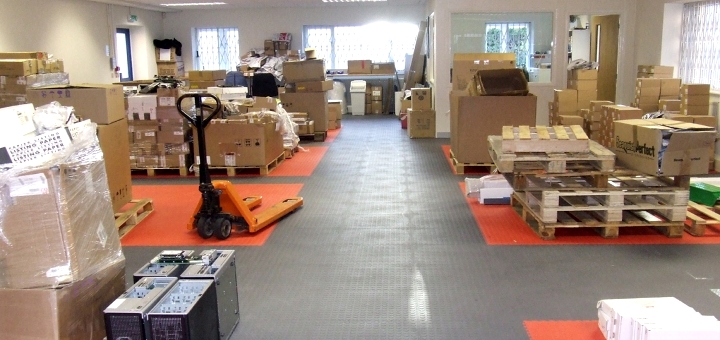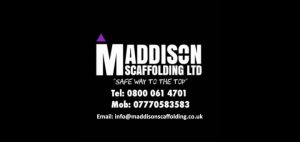Five reasons why concrete isn’t an ideal flooring solution for a warehouse

One of the biggest problems in the commercial flooring industry today is manufacturing a long-lasting product that will withstand the tests of time and activity.
Although concrete can offer advantages such as cost, it also has potential disadvantages – such as poor aesthetics and scope to be easily damaged – that can lead businesses to choose epoxy, painted or new PVC flooring options instead.
Here we take a look at five good reasons why concrete might not be the ideal flooring solution for your warehouse – and suggest alternatives for creating a workspace floor that functions well on every level.
1. Concrete can be damaged by heavy traffic
Concrete floors that take a high volume of traffic will inevitably chip and get damaged, especially if large machinery, such as trucks and forklifts, are travelling on them on a regular basis.
Instead, a replaceable tile option means that if an area of the floor is badly damaged, those tiles can simply be removed and replaced with fresh ones.
2. Concrete isn’t Instagram-friendly
A relatively new factor for businesses is aesthetics, and the look of their warehouses or distribution centres.
With videos and “about the company” sections on the rise, customers want to know and see everything about the firms they are buying from.
These days, you get to see inside companies’ latest warehouses where there are robots and everything regimented down to the last detail, helping to convey a modern and positive image of those brands.
With that in mind, do companies really want potential customers to see a tired-looking concrete floor? Or do they want to show off a bright, vibrant, clean space to be proud of?
3. Concrete floors can become uneven
An excellent example of the importance of a flat and even surface is the sharp rise in the use of robots in warehouses.
Although a qualified forklift operative may be able to see a large hole in the concrete and avoid a bump that could result in the goods falling off or being damaged, a robot is guided by sensors and may head straight into the obstruction.
For environments like this, a solution such as PVC tiles can be quick and easy to install and, if need be, to repair.
4. Concrete flooring can be uncomfortable and cold
Winter can impact on the finances of a company, especially where large heating and electricity bills are involved, and the choice of flooring can be a factor.
According to interlocking tile manufacturer R-Tek Manufacturing Ltd, “concrete floors help keep large industrial areas, such as warehouses, cold in the depths of winter. In contrast, other flooring solutions can help to insulate large areas, and stop cold floors exacerbating an already chilly environment.”
The tough working environment of a warehouse can be made even more difficult by hard floors having a negative effect on the walking and comfort of employees, and modern flooring surfaces are now developed with those ergonomic features in mind.
5. Concrete can be prone to damp
Large, cold, damp units are never good. Where damp is evident on walls or floors, such conditions create an unappealing workplace aesthetic and can have negative impacts on employees’ health.
Concrete floors make it easy for damp and mould to grow and take over spaces; opting instead for a breathable flooring system can help battle this issue.
Conclusion
On large-scale projects, many businesses are now seeing a product like PVC interlocking tiles as more environmentally friendly, economical, and easy to install and maintain compared to concrete – but it comes down to asking yourself the right questions about your warehouse or distribution centre.
For example, what is the timescale of your project? What vehicles will be driving on the floor? What will the weather be like throughout the year?
Answering these questions, and putting some planning and thought into the process, is surely the best way for any business to determine the most obvious and sensible choice of flooring for its industrial workspace.






